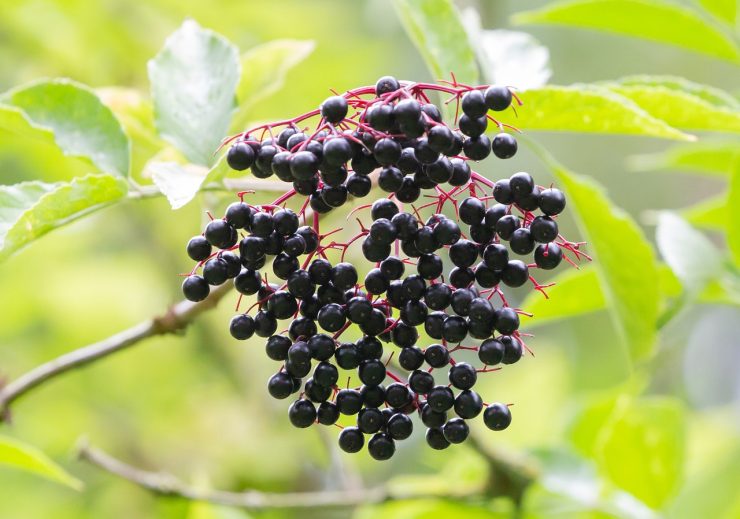Elderberry has gained quite a bit of attention recently, especially as more people look for natural ways to support immune health. If colds or the flu have made the rounds in recent years, elderberry may already sound familiar—it’s commonly used to help manage symptoms and shorten recovery time. And there’s a reason for its popularity: elderberry isn’t just another trendy remedy. It’s been used for centuries for its antiviral and immune-supporting properties.
The elderberry plant, known scientifically as Sambucus nigra, produces small, dark berries that are rich in antioxidants and compounds known to support the immune system. Evidence suggests that elderberry may help reduce the severity and duration of colds and flu, and there’s even some indication that its use dates back to prehistoric times. In ancient Egypt and Greece, it was a staple in herbal medicine.
What Makes Elderberry So Useful?
Ripe elderberries are packed with antioxidants like quercetin, rutin, and phenolic acids, as well as flavonoids and anthocyanidins—natural compounds known to boost immune response and reduce inflammation. These nutrients help block viral proteins from attaching to healthy cells, which may explain why elderberry is effective against colds and flu. It not only helps prevent viruses from taking hold but also inhibits their replication once they’ve entered the body.
Research supports this, too. One study found that people taking elderberry extract during flu season recovered significantly faster than those who didn’t. Another study showed that using elderberry within the first 48 hours of symptoms could shorten the illness by up to four days.
Beyond Colds and Flu
Elderberry also appears to support sinus health, especially during infections. A study conducted in Switzerland found that a combination of elderberry, antibiotics, and a decongestant helped patients with bacterial sinusitis recover more quickly than those who didn’t use elderberry.
Its immune-modulating properties may also offer relief from seasonal allergies, reducing inflammation and calming immune overreactions.
But elderberry’s benefits don’t stop at the immune system. Some research shows potential in areas like:
-
Blood sugar regulation – Elderberry compounds may help improve insulin sensitivity.
-
Cancer prevention – Studies indicate elderberry extracts might slow or prevent cancer cell development.
-
Heart health – Elderberry may help lower cholesterol, reduce blood pressure, and improve liver function.
-
Detoxification – As a natural diuretic, elderberry supports kidney health and helps the body eliminate excess fluids and toxins.
-
Digestive health – Elderberry can support bowel regularity and relieve constipation.
-
Skin health and aging – With its antioxidant and anti-inflammatory properties, elderberry may help reduce signs of aging, promote skin elasticity, and protect against oxidative stress.
Safety and Precautions
Despite its benefits, elderberry does come with a few safety considerations. Only ripe, cooked berries from approved Sambucus species are safe for consumption. Raw or unripe berries—and other parts of the plant—can be toxic and may cause nausea, vomiting, or diarrhea due to their cyanide-like compounds.
It’s also important to talk to a healthcare provider before using elderberry, especially for those who:
-
Have autoimmune conditions
-
Are pregnant or breastfeeding
-
Are taking medications for diabetes, cancer, immune suppression, diuretics, or laxatives
-
Plan to give elderberry to children
While elderberry supplements like syrups and gummies are widely available, it’s always a good idea to double-check the source and formulation.
In summary, elderberry offers broad immune support with added benefits for inflammation, cardiovascular health, and even skin aging. It’s a natural remedy with a long history of use—but like all supplements, it works best when used mindfully and with proper guidance.











